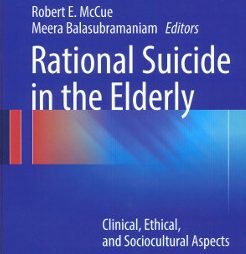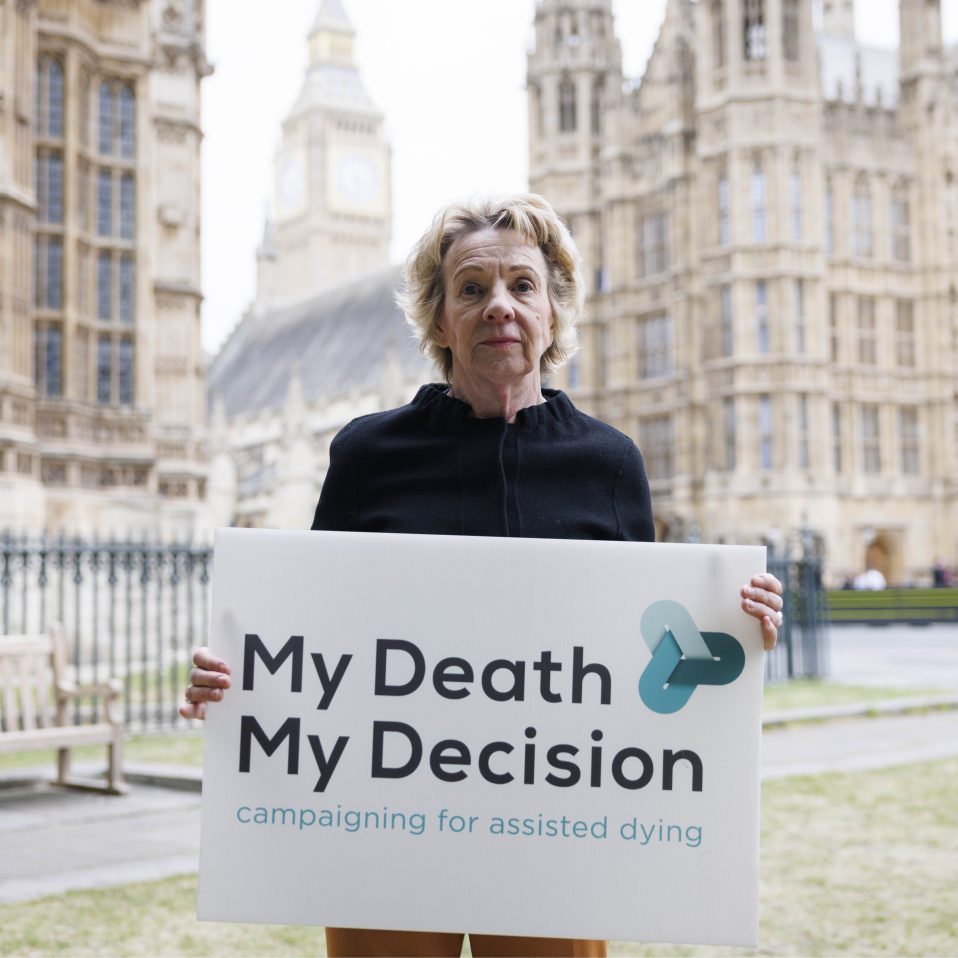Rational Suicide in the Elderly: Clinical, Ethical, and Sociocultural Aspects
by Robert E. McCue (Editor), Meera Balasubramaniam (Editor)
Springer 2017 (8th Oct 2016)
An entire book devoted to the better understanding of Rational Suicide in the Elderly was essential reading for MDMD (Our name was formerly SOARS: Society for Old Age Rational Suicide). We were pleased to see that SOARS gets mentioned on the first page of the introduction and the SOARS website is extensively quoted in Chapter 6 – an indication of the influence of our campaign.
The book is a collection of 15 papers written mostly by psychiatric academics working in the USA who discuss the notion of rational suicide in the elderly and what they see as the best practices for treating patients exhibiting a rational wish to die. The psychiatric viewpoint is broadened a little with contributions from those in departments of psychology, philosophy and oncology. Two of the 18 contributors come from the UK and two from New Zealand. Surprisingly and unfortunately there are no contributions from medical professionals in the Netherlands, Belgium or Switzerland, where much practical knowledge and understanding of rational suicide is developing as those countries have the most far reaching assisted dying legislation in the world.
Many of the authors carefully question the notion of “rational suicide in the elderly”. How old is elderly? What is a “rational” decision? Can suicide ever be rational? But the book’s prevailing view is that, despite the ethical and philosophical considerations, there do exist people who are suffering from an incurable medical complaint, which renders their life no longer worth living in their opinion, who are not terminally ill, nor mentally ill, are not suffering from a curable depression, but have a desire to hasten their death. This is perhaps best demonstrated in a quote from the book’s final paragraph (in a chapter that carefully unpicks and rejects a lot of the standard justifications for “rational suicide”): “It seems to me obvious that it is sometimes better – kinder, more decent, dignified, compassionate – to bring an end to human suffering than to let it continue.”
Many of the issues considered by the authors in developing an understanding of “rational suicide in the elderly” are the same as those raised by SOARS supporters in the discussions that led to the organisation both changing its name from SOARS to MDMD, and broadening its objectives beyond “Old Age”. (And prior to that, in our consultation on the “When is a Life Complete?” document.)
Given that people exist who rationally believe suicide is their “best” option, the book attempts to give guidance to psychiatrists who encounter such people as “patients”. It is here that the book seems to get into several difficulties.
It is implied that the issue of rational suicide in the elderly is only about those who end up as psychiatric “patients”. The presumption is that a true rational suicide would successfully have done the job him or her self, without ending up in the psychiatrist’s consulting room. The fact that they have instead become a patient leads to the possibility that they may be seeking “help” to overcome their suicidal thoughts. Although this may be true in some cases, there are much wider issues, most notably the case of people who “successfully” choose rational suicide without any counselling. Is it the correct attitude for psychiatry, or the wider medical profession to take – to accept people rationally ending their life, without professional counselling; alone; without assistance; and often in tragic circumstances? MDMD think not, we would like to see two forms of help available to all potential rational suicides: first, independent counselling to ensure that they are making the correct decision for them, at the right time; and second, legal medical assistance to die within agreed safeguards. It is only in the knowledge that medical assistance to die is a possible outcome, that people will intentionally seek medical help with their rational suicide decision. Without that possibility, the rational person, wishing to hasten their own death, would avoid discussing their plans with their doctors for fear of either being “treated” until they gave up their desire to end their life, or worse, being physically prevented from doing so, possibly including enforced hospitalisation, as a form of “safety planning”. A third risk for those in the UK considering going to Switzerland for medical help to die, is that a full discussion with their doctor may result in the doctor refusing access to medical records needed by the Swiss organisations who help foreigners. In these areas, the doctor patient relationship appears to be broken.
There is an irony here. Only with the option of legalised medically assisted suicide will potential rational suicides wish to consult their doctor. But once they do, it is likely that their suicide can be delayed and in some cases prevented, while ensuring that more people have the “good death” they should be entitled to. Much better a peaceful medically assisted suicide at a carefully considered “right” time, than a traumatic, lonely unassisted suicide, done too early while the person still can. The book does not consider these benefits of assisted suicide and therefore misses many of the issues that need to be discussed in a full coverage of rational suicide.
One important observation it does make is that the reasons given by people seeking rational suicide who are not considered “terminally ill”, as their life expectation exceeds six months, are identical to those who are terminally ill and receive assisted suicide in US states where it is legal. This usefully highlights why the 6 month criterion is so inappropriate.
Once a potential rational suicide is accepted as a “patient”, psychiatrists are in a very awkward position. On the one hand it can be very difficult for a medical professional to accept that an assisted death or worse, an unassisted suicide, is actually the best option for the patient. There is a tendency to see this outcome as a failure. This attitude is something that MDMD thinks needs to be overcome as society better understands the true nature of rational suicide as being the best outcome for some patients. A more pressing concern, especially in the USA where the book is focused, is on possible legal repercussions from relatives of a suicide who might claim that a psychiatrist involved had been negligent. An entire chapter is devoted to “Rational Suicide and the Law”, and several other chapters stress the importance of “risk assessment”, “safety planning” and “preventing impulsive behaviour”. For both these reasons it seems clear that professionals helping those who wish to actively hasten their death need some form of emotional and legal protection to do this difficult work effectively.
The main approaches suggested for working with people seeking a rational suicide are various talking therapies such as “Motivational Interviewing” to help the person understand the motivations behind the desire to end their lives and to expose and build on any uncertainties and desire for change the patient may have. Authors recommend applying these techniques non-judgementally, with respect for the patient’s views. While these approaches may be successful in preventing suicides, they run the risk of undermining a patient’s choice, possibly making them feel guilty in wanting a hastened death. It seems essential to ensure that the person has properly considered all options, including that they may be able to adapt to changed capabilities, but where should this dialogue stop? At what point should the psychiatrist stop challenging the patient and simply accept their view, even if they disagree with the patient’s conclusion? Many of the authors appear to have an attitude that suicide should be prevented if at all possible. The realisation that a hastened death may actually be the best option for some patients sits uncomfortably with what they are legally and ethically bound to do. A re-evaluation of these legal and ethical limitations seems necessary, but the book does not explore this.
Several authors refer to spiritual or religious belief as helping people come to terms with their dependency and changed circumstances. A full chapter is devoted to Christian objections to suicide. This may be appropriate for a USA audience, but in the UK only 59% of the population consider themselves to be Christian, with 25% of the population claiming no religion – a proportion that has grown by 10% over the preceding 10 years, growing in all age categories. (ONS report based on 2011 census data.) The reducing significance of religion is hinted at in a chapter about the attitudes of the “baby boomer” generation which concludes: “… a significant minority will consider suicide to be an intelligent and rational act in the face on an irreversible worsening in the quality of life.”
The penultimate chapter suggests that one or two doses of psychedelic drugs such as psilocybin might be an effective “treatment” for those who have lost meaning in life, possibly to the degree that suicide could be prevented. While this may suit some people, and may indeed reduce suicidal ideation, we must question the extent to which rational suicide is an illness to be treated with drugs that alter the person’s personality, as opposed to respecting the person and their personality as they are, and accepting rational suicide as it purports to be – a rational evaluation of one’s likely future quality of life leading to a decision that the person would be better off dead.
While several authors acknowledge that in some cases a hastened death would be best for the patient, the practical advice is all about attempting to alleviate symptoms, especially in cases where the patient can be helped to find some new reason for living. An important issue that is not tackled is how to help someone decide that their death should be hastened – or rather to corroborate the decision that the person has already reached. Of course, without the necessary law, the decision is irrelevant as the psychiatrist cannot assist. But advice from the psychiatric community is necessary in order to draft appropriate, safe and workable laws. A good law would enable more appropriate action in cases where, after full consideration with professional help, the patient is convinced that a hastened death is in their best interests.
Although the book has the serious limitations noted above, it is a step in the right direction. Many difficult issues are carefully analysed in commendable depth. Psychiatry (and the law) has a long way to go before it can be said to fully support the real needs of people whose quality of life is permanently, unacceptably low, to the point that they consider hastening their death. But at least the issue of rational suicide for people with intolerable quality of life, due to incurable medical conditions, is now firmly placed on the psychiatrist’s couch.













Recent Comments